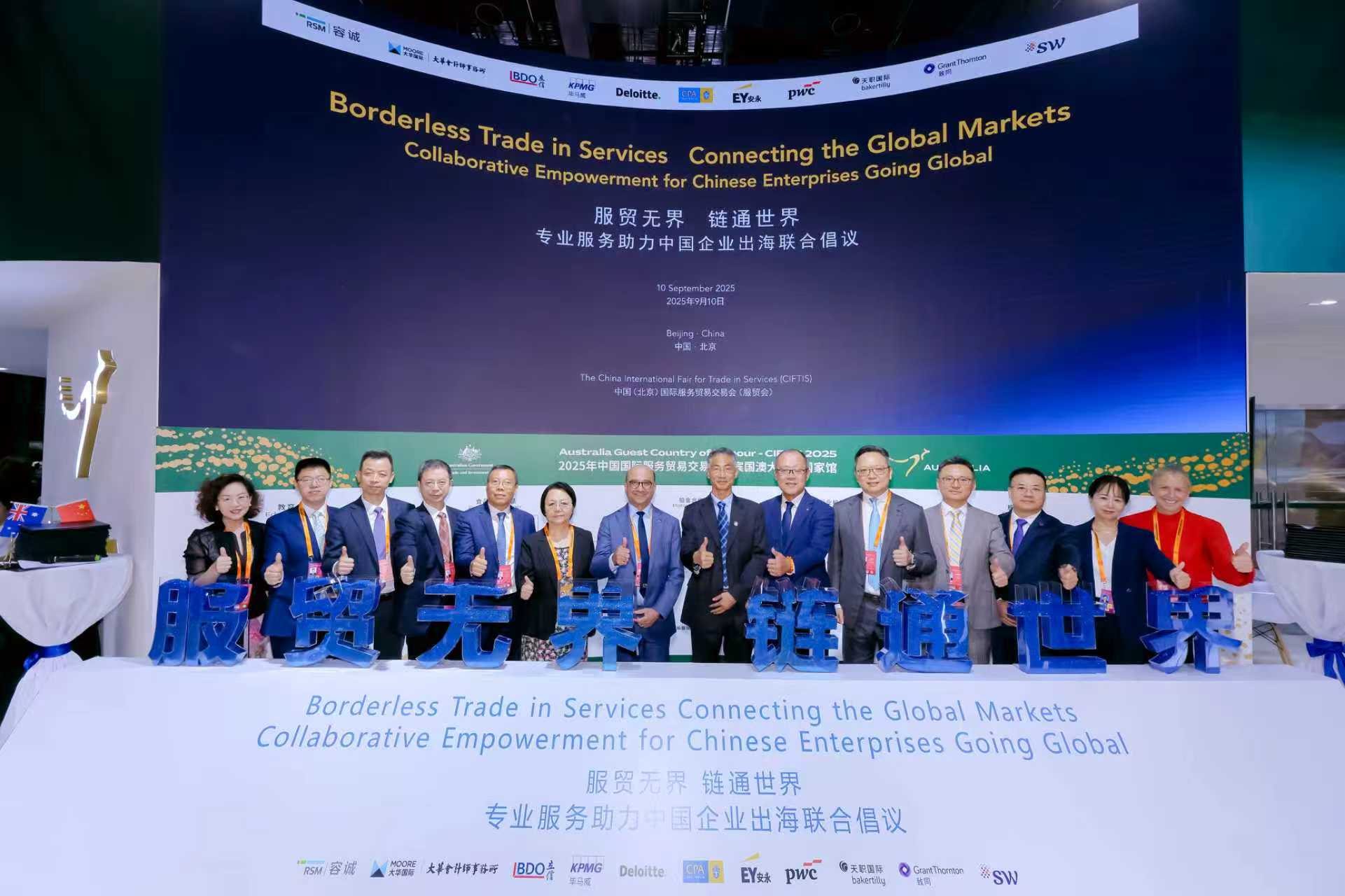 Chinese Enterprises' Global Expansion Spurs New Opportunities in Service Trade
Chinese Enterprises' Global Expansion Spurs New Opportunities in Service Trade(Yicai) Sept. 23 -- The overseas expansion of Chinese companies has created new development opportunities for service trade amid a complex and volatile global economic environment, according to industry experts.
As global trade shifts from goods to services, new energy, electric vehicles, cross-border investment, and other sectors have become key cooperation areas, providing Chinese firms with differentiated pathways for global expansion, Dale Pinto, president and chairman of CPA Australia, told Yicai on the sideline of the the China International Fair for Trade in Services 2025, held in Beijing from Sept. 10 through 14.
The Chinese government's "going global" strategy has further stimulated demand for financial services in many areas, including investment, financing, and cross-border insurance, providing critical support for companies venturing overseas, Pinto pointed out.
Given the profound impact of geopolitics and complex market environments, firms are increasingly focusing on supply-chain diversification for technology acquisition and market access, according to Pinto. Outbound direct investment has shifted toward Asia and the Association of Southeast Asian Nations, while that into North America and Europe has moderated, creating significant demand for related professional services, he added.
"Chinese companies going global face compliance challenges in two major dimensions: taxation and finance," said Justin Qiu, president of CPA Australia's North China Committee for the 2021 to 2022 term, Baker Tilly China Managing Partner.
Countries worldwide continue strengthening their tax regulatory frameworks, so "companies must keep up with these rules and changes, especially in regions with volatile tax policies, such as the Middle East and Africa," Qiu pointed out. “Globally, penalties for non-compliance are becoming increasingly severe, further intensifying the tax compliance pressure for cross-border operations.”
For example, Hong Kong-based gaming firm Nikkei faced JPY1.8 billion (USD12.2 million) in tax penalties and additional fines from the Tokyo Regional Taxation Bureau between 2020 and 2022 for failing to declare consumption tax on in-app sales revenue from Japanese users. CPA World Service PC reported a similar case where a cross-border e-commerce company faced over USD400,000 in back taxes and penalties in the US for unreported sales revenue in California, even receiving a liquidation threat from the state government.
The global minimum tax rate also poses challenges, Qiu noted. The rapid implementation of the Organisation for Economic Co-Operation and Development's Pillar Two rules, part of its Base Erosion and Profit Shifting 2.0 initiative, which set a 15 percent global minimum tax rate, significantly impacts Chinese firms with high-profit operations in low-tax jurisdictions, Qiu said. That’s why one such company had to close its holding unit in a low-tax region to consolidate entities and simplify tax reporting.
Financial compliance challenges are equally pronounced, according to Qiu. Variations in financial reporting standards, such as International Financial Reporting Standards, US Generally Accepted Accounting Principles, and local GAAP, require companies to frequently navigate differences, impacting their decision-making, Qiu added.
In addition, rising financial costs and a shortage of professional talent exacerbate pressures, Qiu said. As cross-border operations expand, companies face additional compliance costs in overseas markets, including local tax filings, financial audits, and disclosure requirements, Qiu added.
Qiu pointed out that there is a clear shortage of professionals with expertise in overseas financial compliance, who must understand local tax regulations and possess bilingual communication skills, driving up labor costs.
For example, a New York-listed artificial intelligence chip firm entering the US with cutting-edge tech faced significant setbacks due to unfamiliar export control rules and a lack of bilingual legal support.
During a forum yesterday, Guo Mingkun, senior partner at Fujian Fidelity Law Firm, discussed the impact of geopolitics on Chinese overseas investment, saying that some firms ship products to Vietnam, designating the country as the one of origin to benefit from US tax reductions. However, the Vietnamese government, concerned about potential US tariffs or regulatory changes targeting investments aimed at tariff avoidance, has intensified scrutiny of such companies, Guo noted.
These challenges have given rise to significant opportunities in the professional services market, according to Qiu. “We recommend viewing such costs as long-term investments rather than mere expenses, as proactive planning and investment can better address challenges and pressures in future operations.”
Companies should build comprehensive compliance systems that meet Chinese and international standards, proactively adopting higher-standard business practices, including in areas such as environmental, social, and governance, which have become "invisible entry tickets" for accessing developed and emerging markets, Qiu suggested.
"Chinese firms can enhance supply chain resilience through regionalized diversification, upgrade supplier management systems, improve operational stability, and leverage policy tools like the China-Australia Free Trade Agreement to optimize supply chain layouts," Qiu noted.
According to Qiu, Chinese companies going global must pair early tax risk screening and robust sale and purchase agreement protections with prudent structuring. This lean but disciplined approach is particularly critical for small and medium-sized enterprises, helping prevent costly disputes and ensuring smoother post-deal integration, Qiu said.
Chinese investors had established 52,000 overseas firms across 190 countries and regions as of the end of last year. China's outbound direct investment flow rose 8.4 percent to USD192.2 billion last year from the previous year, accounting for 11.9 percent of the world's total, up from 11.4 percent, ranking it in the top three globally for the 13th straight year.
China's total outbound direct investment reached USD3.14 trillion as of Dec. 31, keeping it among the world's top three for the eighth consecutive year.
Editor: Martin Kadiev